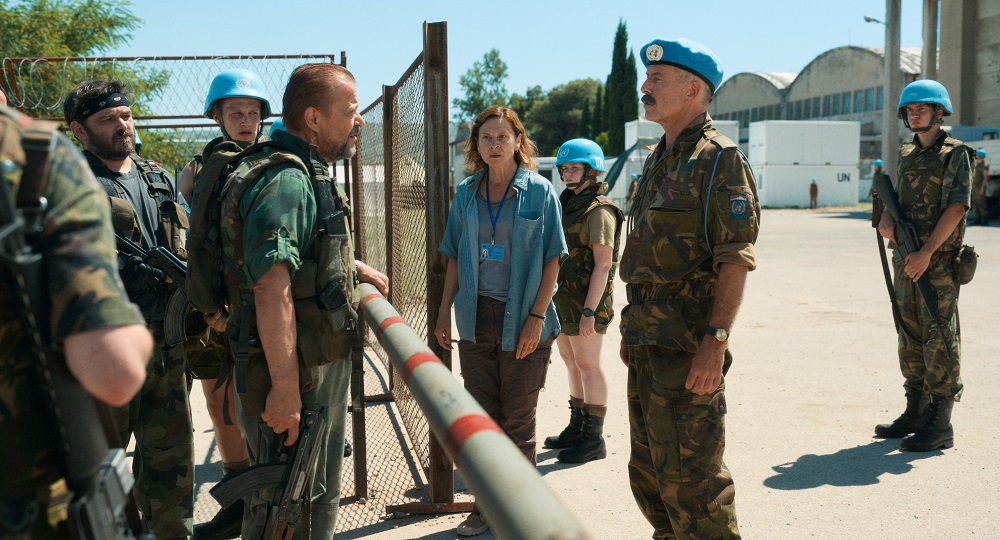
Jasmila Zbanic is a courageous artist who dared to tackle a topic rarely anyone would be willing to touch, actors who played in her movie ‘Quo Vadis, Aida?’ told N1 after the film was shortlisted for the Academy Award.
Dozens of films were eliminated from the list of international feature films competing for this year's Academy Award, but Bosnia’s submission has been shortlisted alongside other 14 foreign films in the race for the prestigious award.
“Fifteen films will advance to the next round of voting in the International Feature Film category for the 93rd Academy Awards. Films from 93 countries were eligible in the category,” said the official website of the prestigious film award.
The award ceremony is set for April 25, 2021. Official nominations for each category will be unveiled mid-March.
‘Quo Vadis, Aida?’ premiered at the 77th Venice Film Festival, one of the oldest and most significant in the world’s film industry.
The plot revolves around Aida, a translator working for the UN in the protected safe zone of Srebrenica on the eve of the July 1995 genocide.
"We knew from the very beginning that we were working on a big topic, that we were dealing with a difficult topic that would be important for all of us in Bosnia and Herzegovina,” said Boris Ler, who plays one of Aida’s sons. “We knew it would resonate across the world,” he said, adding that he is optimistic that the film will make it into the top five.
“This is a new step for the film, the next step is for as many people as possible to see it. That is the most important thing,” he said.
Everyone on set bore a great responsibility out of respect for the victims and survivors of the genocide, Ermin Bravo, who played the mayor of Srebrenica, stressed.
However, “when you are led by such an author and director - you are sure that you are in good hands,” he declared.
Bravo described work on the film as ‘demanding’, but noted that it was important for him, and his colleagues, to be part of the project.
"Jasmila has some kind of courage,” Bravo said, explaining that “as a woman, a director, she chose such a difficult topic that no one dared to touch.”
“More importantly, the film is good. The most famous critics speak very nicely of it,” he said, adding that he hopes the nomination will help in having as many people as possible see it.
According to Emir Hadzihafizbegovic, who also had a role in the movie, “it is no coincidence that the project was among the 15 films competing for the Oscar.”
The actor said that preparation is the most important thing for making a film and the work on the screenplay for Quo Vadis, Aida?, the casting and all other parts of the process took a very long time.
Hadzihafizbegovic remembered the complete silence on the set while shooting certain scenes, although there were nearly 1,000 people present. “This was an indication that we were doing something significant,” he said.
Hadzihafizbegovic explained that he was given the role of a war criminal and that he had no problem accepting it, despite the fact that he lost family members in the 1995 genocide.
“I think that it is good to work on films like this with a time distance, and I think that some other topics, such as the siege of Sarajevo, will come into the focus of directors eventually,” he said.
The actor also congratulated the Dutch actors, saying that they played important roles and did a great job.
Quo Vadis, Aida? has made it “into European cinematic history,” he said.
However, the film is not being screened in Bosnia’s Serb-majority Republika Srpska (RS) entity or in Serbia.
According to Hadzihafizbegovic, once the film is screened there, it will finally be an indication that there is “some kind of political disapproval of the genocide.”
"Whoever does not recognize the genocide is ready to commit it again. Politicization is inevitable,” he said.
The filming of Quo Vadis, Aida? was an uphill battle in a country where authorities do not support the domestic film industry too much, Ler said.
"We have a lot of talented actors, directors, screenwriters, writers - but simply the people who distribute the money are deaf to everything we can offer. That's sad,” Ler said.
Kakvo je tvoje mišljenje o ovome?
Učestvuj u diskusiji ili pročitaj komentare





 Srbija
Srbija
 Hrvatska
Hrvatska
 Slovenija
Slovenija







